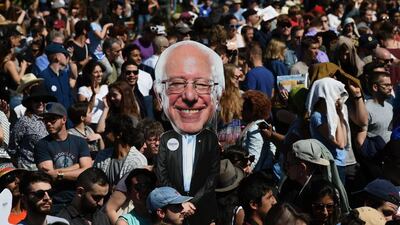NEW YORK // The state of New York is home to the world’s biggest financial market and America’s biggest city but it is not used to playing an important role in the selection of presidential candidates. This year, however, it is different.
In most campaign seasons, the Democratic and Republican parties have a clear idea of their presidential nominee by the time the primaries roll around to New York. But this year they have been unusually competitive and contenders are looking to tomorrow’s New York primaries to give them an edge.
It is not just about winning: the polls show Hillary Clinton leading Bernie Sanders by about 10 percentage points on the Democrat side, and Donald Trump even further ahead for the Republicans – on 54 per cent, with Ted Cruz on 21 per cent and John Kasich 19 per cent.
This is about winning convincingly: Mr Trump needs a thumping victory if he is to have any chance of reaching his delegate target of 1,237 at the Republican convention in Cleveland, Ohio, in July, and Mrs Clinton needs the same is she is to see off a challenger who, despite apparently having little chance of becoming the Democrat nominee, simply refuses to back off.
The New York race has added spice because the main candidates consider the state their home turf.
Mr Trump was born in Queens and made his property fortune here, Mr Sanders is from Brooklyn and Mrs Clinton was a senator for New York from 2001 to 2009.
The Democratic candidates, in particular, have attracted immense interest and discussion in the city. Posters of Mrs Clinton and Mr Sanders appeared across the five boroughs, with shops and businesses displaying their support.
In Cafe Nadery, an Iranian restaurant in the southern end of Manhattan, the vibe was clear: Bernie all the way.
A poster with Mr Sanders’s distinctive silhouette, bearing the word “BERNIE”, hung on the door. More posters lined the walls inside. Even the customers seemed to be drawn from a pool of Mr Sanders’s supporters.
“He’s refreshing. He says the things nobody else dares to say, and that’s important in a presidential candidate,” said Vivian Blauer, 42.
New York City is the stage for one of Mr Sanders’s boldest promises: if elected president, he will break up big banks and financial institutions, shrinking the power that he says Wall Street holds over US politics.
“The greed and recklessness and illegal behaviour of Wall Street brought this country into the worst economic downturn since … the Great Depression of the 1930s, when millions of people lost their jobs, and their homes, and their life savings,” Mr Sanders said in a debate with Mrs Clinton in Brooklyn. “The obvious response to that is that you’ve got a bunch of fraudulent operators and that they have got to be broken up.”
Mrs Clinton was a friend of Wall Street who was “giving speeches to Goldman Sachs for US$225,000 a speech”, Mr Sanders said.
These positions found loud favour during a rally in Washington Square Park. About 27,000 people came to the event – a mostly young and racially diverse crowd.
“You see such extreme inequality here in New York City,” said Saleem Pervez, an Indian immigrant who has run a newsstand near New York University for more than a decade. “That’s why Sanders tends to be popular here.” The poor and the middle class respond to his message about the rich growing richer, Mr Pervez said.
But the cold arithmetic may not work in Mr Sanders’s favour.
For one, many of the state’s poor – or its population of immigrants – may not be registered to vote. Their support is vocal but ultimately irrelevant. For another, New York holds a closed primary, so that only voters registered as Democratic or Republican can cast their ballot.
Voter registration deadlines have been tight and inflexible. Two of Mr Trump’s children live in New York but cannot vote for their father because they missed the deadline.
The allocation of delegates to the party conventions is a byzantine process that differs from party to party and state to state.
In the New York Democratic primary there are 291 delegates at stake, allocated proportionally. Mrs Clinton is likely to win more than Mr Sanders, but nowhere near enough to secure the nomination yet.
In the tally of delegates already elected, Mrs Clinton leads Mr Sanders by 1,289 to 1,045. She also has the support of 469 superdelegates – senior party officials free to support the candidate of their choice – compared to only 31 for Mr Sanders, giving her a lead of 1,758 to 1,076. There are 1,931 delegates still to be allocated, and the winner needs a total of 2,383.
On the Republican side, Mr Trump has 744 delegates, Mr Cruz 559 and John Kasich 144. There are 95 delegates at stake in New York, also allocated proportionally.
Most experts believe Mr Trump will win about 80 delegates, and that he is unlikely to reach the 1,237 target.
ssubramanian@thenational.ae

